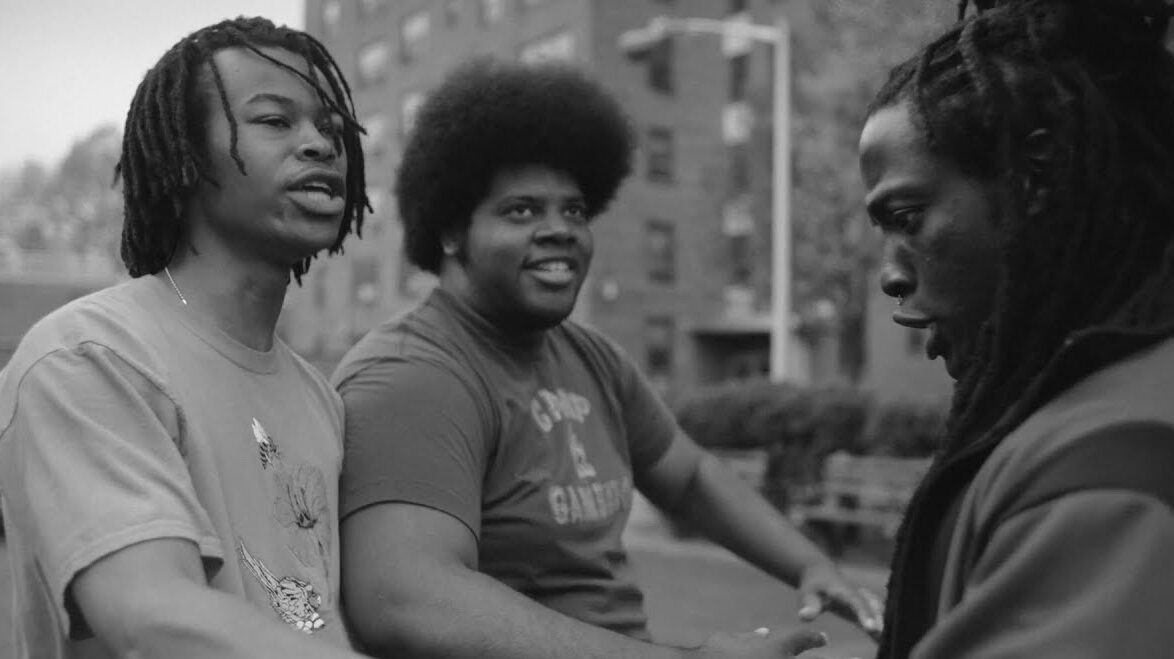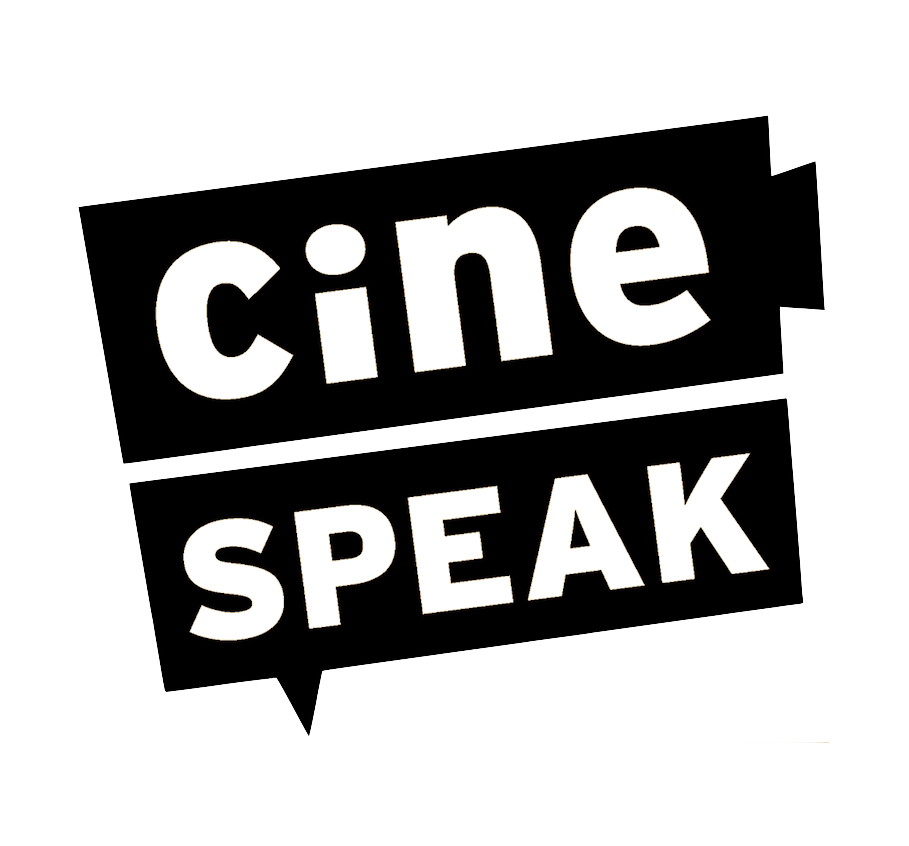
16 Dec The Only Way Is Forward: cinéSPEAK End Of Year Retrospect
A Note From Our Editor-in-Chief
BY MONIKA ESTRELLA NEGRA
The end of 2021 is bittersweet. As we head into our third year of the Covid-19 pandemic, a lot of us are feeling unsure about the future holds for us. It is said that art often imitates life, but for many, film and television has provided a much needed escape. While the need to escape the soul crushing realities of life are necessary, films that discuss the realities of our world are just as equally important. The politics of life are tricky and it would be foolish to ignore the problems that exist. Film has proved to be an important tool to aid in furthering discussions of a better today, a better world. This is why cinéSPEAK exists.
When I came on as Editor-In-Chief, I had no idea what to expect. I knew that cinéSPEAK was a respected organization in Philadelphia and had been doing the work of providing a space for creative voices, with a dedication to moving image and social justice. I felt an immense source of pride for taking the task of aiding in the development of the digital journal. With the Editorial Collective and managing editor Sophia Abraham-Raveson, I was able to decipher the tone and reach of the journal. There have been amazing films and programs throughout the year, despite the pandemic. To cover everything would have been quite the feat, but I believe that the articles published in these few months have covered a breadth of material. The films and programs we covered during this time are reflective of what we are feeling and experiencing. We covered a lot of ground in terms of the issues that have yet to be resolved. Transformative justice, abolition, Black resistance – nothing was off the radar.
So while we are unsure of what the future has to offer us, we must remember that we can only move forward to the great unknown. It is there where we will create new ideas and bring more stories to the masses. Is there where we will find commonality with each other, and a brighter future tethered together by community, art and resistance.
These are the works created by our community since my tenure started.
Dedza Scrapbook is a collective of marginalized filmmakers with a quest for eliminating culturally appropriative voyeurism in film. cineSPEAK had the honor of virtually screening the shorts earlier this year and recently, the collection has been added to the Criterion Channel. A stunning collection of shorts made by POC and Black filmmakers, Who Will Start Another Fire? is a declaration of autonomy by marginalized filmmakers from an industry that has tried to ignore their stories.
Editorial Collective member Bedatri Choudhury interviewed members of the collective this past summer.
“Film criticism, especially when written by emerging critics of color, doesn’t enjoy a proximity to the formal film distribution industrial complex. “When people start out, the first places to accept their writing are niche, often obscure websites and blogs,” Hunt says, “The whole idea of the Scrapbook was to allow film criticism a space that is right alongside distribution channels.” Within an ecosystem that we are taught to treat like a finite pie, an organization like Dedza, with its programs and Scrapbooks, dares to do something that is quite the opposite—to hold space, to expand it, so others can come and stand side by side. Within this new space, there is enough room; for people to make films, for people to watch them, for people to write, and for people to read. To light fires and then pass on the spark. To know that there will always be someone to start the next fire.”
In this celebratory piece, Hansen Bursic profiled five Philadelphia based filmmakers who were bringing LGBTQ filmmaking to the forefront. Notable mentions include Chet Pancake, M. Asli Dukan and Editorial Collective member, Kristal Sotomayor.
“We are deep into Pride Month, and in Philly we have so much to celebrate. Philadelphia has a thriving and diverse LGBTQ community, and the city is a hotbed of queer and trans filmmaking. This list celebrates five incredible LGBTQ filmmakers who call our city home, including two who are a part of the cinéSPEAK family! When so much of Pride looks like rainbow capitalism and whitewashing LGBTQ history, let’s bring it back to the queer and trans creators who are challenging these narratives every day.”
The film Zola, which began as a twitter thread, received it’s fair share of critical success this past summer. Directed by Afro-Latinx Director Janicza Bravo, the film was a sleeper hit, earning many dissections about its racial dynamics. Lea Anderson provided another critical piece, covering the Hollywood trope of “Racial-Pairing Paradigm” that has been used in numerous films. While the interracial pairing trope has been explored, the topic of gendered interracial partnerships has gone largely undiscussed. Lea provided an excellent introspect in the complexities of interracial friendships and the way they are depicted within film.
“According to Fielder, the racial-pairing paradigm refers to the dynamic wherein “racial-pairing stories do not work primarily to generate white sympathy for black characters,” but more often exemplify how “literary models of interracial sympathy tend to universalize and prioritize whiteness and white life experience as normative positions of readerly identification.” While the term “racial-pairing text” can refer to any interracial pairing–from depictions of coworking relationships (Lethal Weapon, Men in Black) to romances and familial dynamics (Guess Who’s Coming to Dinner, Save the Last Dance)–this piece focuses on gendered friendships, and the fact that more often than not, paired models of interracial feminine friendship are constructed to orient themselves around and in service of their white characters. By privileging the perspective of its Black lead, the 2021 film Zola not only flips the script on all this, it also repurposes the racial-pairing paradigm to tell a coming-of-age story that may not leave its audience with warm fuzzies but raises essential questions about the limits of interracial friendship and what it even means for a white person to claim they love a Black person.”
Emily Cohen Ibañez spoke with Kristal Sotomayor about her latest documentary, “Fruits of Labor” for Latinx Heritage Month. The film follows the story of a young Latina farm worker who is responsible for her family’s survival. A story of the ills of the capitalist slave wage system, this interview explores the struggles often faced by second generation children of immigrants and another perspective of American life for a teenaged girl, burdened with adult responsibilities.
“For many children of immigrants, there is an immense pressure to support their family and siblings. The eldest child typically holds the most responsibility by translating for their parents, caring for their siblings, and putting their dreams on hold to support the family. In the documentary Fruits of Labor, directed by Emily Cohen Ibañez, the Colombian American filmmaker forms a unique relationship with high school senior Ashley Solis to explore the coming-of-age story of a second-generation Mexican American teen.”
Music has always been a form of resistance for social justice movements. In Quest Love’s Summer Of Soul (…Or When The Revolution Could Not Be Televised), we are transported to the summer of 1969 in Harlem, where the Harlem Cultural Festival ignited a movement and inspired many budding revolutionaries for generations to come. In contrast to Woodstock, the Festival was buried in history, this film bringing it back to the masses. John reflected on his own personal memory of Black musical resistance in Philadelphia while also discovering the national links of Black diasporic musical tradition and civil rights.
“For as long as I can remember, the African/Black American cultural festival has been an institution in my life. Both of my parents are from North Philly–the Nicetown-Tioga section to be specific. Some of my earliest memories are of summertime block parties in the neighborhood that were full of dancing, barbeque, laughter, and joy. One particularly powerful memory of those days is of the storefront cultural space on Westmoreland street that would bring djembe drummers, masked stilt-walkers, dancers, and other African cultural productions to the gatherings. Witnessing all of this unfamiliar music and art was very exciting to me as a kid, and it made an indelible impact on my viewpoint of the world and my own understanding of what it meant to be Black in America. Without many tangible, physical connections to Africa and the diaspora, these cultural festivals have provided Black Americans with a chance to reconnect the cultural links that the transatlantic slave trade sought to sever permenantly. By opening space for Black folks to commune with each other and celebrate our history and culture, these festivals have been an important tool in Black America’s long and arduous effort to develop a deeper, more whole sense of self.”
cinéSPEAK had the opportunity to showcase local Philadelphian filmmakers at Cherry Street Pier in mid July. The theme of the showcase was “Love and Joy: Local Film Shorts”, a love letter to the creativity that thrives within Philadelphia. Editorial Collective member Mariam Dembele had the pleasure of interviewing some of the filmmakers chosen to screen their work.
“What does joy look like? After a night of tension and self-doubt, working up the courage to ask a lover to become a partner. A moment of forgiveness and acceptance after a hard break-up. Finding connection in a new city. Living in old memories. Or simply styling the edges of a friend’s hair.
At cinéSPEAK’s On Love and Joy: Local Film Shorts showcase, five local filmmakers reflected on what love and joy means to them and how to embody those emotions within film. Using only four to eleven minutes of time, the filmmakers brought us on a journey. Some of the films began with a somberness, then pinpointed the moment of overcoming and happiness. Others weaved joy in between moments of hardship. And one film unapologetically radiated joy from beginning to end.
That was felt in the first film in the showcase, Angel Edwards’ THIS IS FOR US, a love letter to Black queer femmes and the community they build.”
Gabe Castro, one half of the popular horror podcast Ghoul’s Next Door, took us into Halloween season with their piece about The Purge franchise. Looking into the revolutionary subtext of the franchise, Castro discussed the horrors of immigration, xenophobia and what revolution could look like for the marginalized of the United States.
“For nearly a decade, the fictional murderous release known as the Purge has been a part of our cinematic landscape. The evolution of the Purge franchise from home-invasion to political horror reflects our country’s own revolutionary fervor and political ails. Slowly expanding the universe’s lens and political imagery, the franchise shifted into intentional commentary that considers its BIPOC audiences–viewers who easily believe in a world that legalizes crime to further oppress their communities. The franchise ultimately reveals that everyday people don’t have a secret desire to commit crimes, and brings to light the true horrors of our society that BIPOC have always known: that those in power will use our pain and bodies to build their righteous world upon. Audiences weren’t equipped for a film like The First Purge or The Forever Purge in 2013, when complacency and comfort were expected and anyone asking for police reform or prison and ICE abolition were seen as radical, their arguments unfounded. The latest installments show us the growth of not only the series but of the audiences. After the volatile, tense summer of 2020, The Forever Purge is a close and expected reality.”
What does the Black Woman’s narrative look like within horror? Dani Bethea credits writers such as Toni Morrison, Tananarive Due and Robin Coles Means as the mothers of the movement. The future for Black women’s participation within the genre however, it a bit unclear. Using Candyman as impetus for their deep dive, Dani explores the difficulties of bringing authentic Black narratives to the genre, without censorship.
“One of the tentpoles of the horror genre is the written word. Before celluloid, the imaginative space of books was where one would frequently be privy to horrors unimaginable, or if you were a Black person living in the United States during enslavement or Jim Crow, nothing was out of the realm of the imagination. Black women authors have been exploring horror themes and settings in their work for more than a century, whether it was immediately apparent at first glance or not.”
cinéSPEAK was absolutely overjoyed to have Mariam conduct an interview with Maya Cade, Founder of the Black Film Archive. The Archive, which launched earlier this year, is a testament to the illustrious and brilliant legacy the Black disapora has created and sustained within the film industry. The Archive is also a reminder that film needs to be preserved and cherished, in order to share with future generations.
“Maya Cade: I think this all started last year in the pandemic, like many things did. There was this moment of reckoning about what it meant to be a Black person, and the constant conversations about representation just felt limited to me. I think there were a lot of conversations about Black trauma and this very limited scope of what Black representation meant in film. Because people kept bringing the same 10 films. I started really critically thinking about what does it mean to give people a history of the past? What does it look like? How should it feel?
So, I started a Twitter thread in June 2020 while this was happening and started to kind of get at that answer. But I realized very quickly that having a Twitter thread of a listing of films isn’t enough. I needed to expand the idea.”
Staying strong throughout the pandemic, the Philadelphia Asian Film Festival returned for another (virtual) year. Diana Lu spoke with festival Director Selena Yip on the challenges and triumphs of last year’s festival and the expectations of the 2021 “hybrid model” festival.
“The Philadelphia Asian American Film Festival—the largest of its kind on the East coast—returns for its 14th year. The 2021 festival goes hybrid, with many impressive showcases and panels of diverse filmmakers both IRL and in the comfort of your home. What has PAAFF learned since going virtual last year, including the needs and desires of the community? cinéSPEAK sat down with Festival Director Selena Yip to talk about the new normal in festival culture, fostering the AAPI filmmaker community, and truly representing the diaspora—behind and in front of the camera.”
Hansen had the chance to sit down with some of the brilliant minds of Working Films, an organization that funds filmmakers who believe in a different kind of future. The Docs in Action fund is the largest fund from Working Films and five filmmakers were chosen to further their messages about transformative justice and the future for abolition.
“Working Films is also looking to inspire, not just with films like Chan’s but with their approach to funding. Their hope is that foundations and funders see that this movement-first model is both possible and impactful and that funders adapt it for their own grants. With the past successes of the Docs in Action grant and a dynamic new group of filmmakers, Working Films continues to establish itself as a funder that truly cares about uplifting underserved voices, rejecting the status quo. “At our core, we are organizers and abolitionists,” says Leonard. “We are here to support movement work.”
In a moving interview with Brontez Purnell, Alex Smith celebrates the legacy of Black, queer filmmaker Marlon Riggs and his lasting impression on Brontez’s film short 100 Boyfriends Mixtape.
“In that light, 100 Boyfriends Mixtape is available as part of a small collection of shorts on the Criterion app dedicated to and inspired by the work of Marlon Riggs, a Black queer filmmaker whose late 80s and early 90s works include such stand-outs as Tongues Untied and Ethnic Notions. Riggs was known to intersperse narrative and fictionalized accounts with documentary, dance, and poetry, often within the same film. The results are beautiful, powerfully stated pieces of fragility stretched over a filmography that truly inspired a wide berth of Black and gay filmmakers.”
cinéSPEAK generates dialogue at the intersection of moving image and movement building, with a primary focus on Philadelphia and connections to the world at large. We increase visibility and paid opportunities for historically-excluded contributors—especially those that are entering and emerging in the industry.
Since our journal’s founding in July 2020, we have published over 50 articles—85% of which were written by individuals who are Black, brown and/or Indigenous women or non-binary. Learn more about the Core Values drive our work. Join us in becoming a one-time or sustaining supporter of our work—Donate here.

Monika Estrella Negra is the Editor-in-Chief of cinéSPEAK, as well as a freelance journalist, filmmaker and curator of all things radical in media. Her first short titled “Flesh” is about a Black femme serial killer navigating the Chicago DIY punk scene (of which was included in the ‘Horror Noire’ syllabus). She has directed three additional shorts, ‘They Will Know You By Your Fruit’, ‘Succubus’, and the in production ‘Bitten, A Tragedy’. A writer, a nomadic priestess, spiritual gangster and all around rabblerouser – Monika has written essays for Syfy Fangrrls, Black Girl Nerds, Grimm Magazine, Black Girls Create, Black Youth Project, Rue Morgue, Fangoria, Wear Your Voice Mag and is the author of a zine series (Tales From My Crypt). In addition, she is the creator of Audre’s Revenge Film and Black and Brown Punk Show Chicago, a GRRL Haus Cinema Resident Filmmaker (2019) an Editor for Decoded Pride.

Sorry, the comment form is closed at this time.